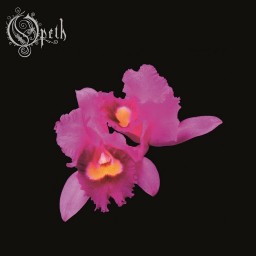Reviews list for Opeth - Orchid (1995)
Opening your debut album with a fourteen-minute track takes balls. If you fail to engage me as a music listener within the first few minutes of an album, then chances are you have lost me before you even really get going. The human attention span is actually less than that of a goldfish someone told me recently so if eight seconds is my limit then fourteen minutes is a big ask. Thankfully though, In Midst She Was Standing is an absolute triumph. It is majestic and dark throughout its tenure at the start of the record, drawing you in to the rest of the album and now of course one of metals best known careers. It manages to shift as a track almost effortlessly and without falling over its own feet at any point. Espousing progressive leanings from the start, Orchid continues to wear these prog rock influences on its sleeve for the duration of what is a fine debut.
At the same time though the album is steeped in a haunting density, with passages of weighty atmospherics leading into subtle changes of pace to resurrect the progressive elements of the sound without ever feeling clunky or bloated either. There is an overall feeling of melancholy that never quite leaves the ether as the album works its way through each track. This melancholia can be heard in the twang of the bass strings, or the harrowing melodies of the lead guitar and likewise they appear via piano keys also. The only part of the instrumentation that feels sterile, even by these ethereal standards are the drums. They feel a bit lost in proceedings and struggle to make their presence felt most of the time. Oddly, this lack of oomph from behind the kit doesn't detract too much from the overall experience as there's enough going on to hold the interest anyways.
Akerfeldt's vocals range from the familiar rasping death metal style that he became famed for to the cleaner more diaphanous vocals of much of the bands later output. There is an equal mix of riffage and picked acoustics from the guitars also which change pace from urgent and busy fluency to more melodic and mellifluous sections that strike clean notes that seem to fill the very air around them. When in full flow though the band sound like a raging beast that always has surprising awareness of its surroundings at all times and controls itself immaculately well.
An extremely underrated work in the Opeth discography. This is one of their jewels.
"In The Mist She Was Standing" is a full-blown epic in the vein of "Black Rose Immortal" and is a sure-fire Opeth classic. "Forest of October" is my personal favorite track because of the haunting acoustic melody that begins and finishes the song. The instrumental interludes "Silhouette" and "Requiem" are dark and majestic and add significantly to the atmosphere of the album. The bonus track "In The Frost of Winter" is a raw black metal demo that reveals a different side of Opeth. The riff in that song topples mountains.
My strongest memory of this glorious, beautiful album is listening to it on repeat as I spent an entire 12-hour day reading "Inheritance", the final book in the Eragon saga. Deserves more respect and recognition that it gets compared to other Opeth albums.
I first experienced Opeth in late 1995 when my younger brother brought home the “Orchid” CD. I think I’d heard a track on a compilation earlier on but that was the first time I sat down & gave them a good listen. My brother quickly became obsessed with this record but I was somewhat more tentative. It certainly didn’t sound like anything else that was being released at the time. It intrigued me & commanded a certain level of respect however I wasn’t sure I was able to turn that into the sort of passion that others were showing for this band.
“Orchid” is an incredibly ambitious concept for a debut album. And in many ways I feel it was perhaps a bit too much of a stretch for them at this early stage in their career. It takes more than technical ability to write the sort of 10+ minute progressive epics the band had in mind & although they really nailed some elements of their idea I think they also had a lot to learn about composition. The basis of their sound seemed to be quite clearly drawn from the melodic death metal sound that was steadily gaining momentum in Sweden at the time. There is a constant focus on melody throughout the album & many of the riffs are quite complex in a way that reminds me of early Dark Tranquility. However unlike much of the melodeath scene Opeth tended to keep things at mid-tempo with the occasional slower doomy section. This more controlled approach to tempo heavily contributed to the overall atmosphere of the music although I have to admit that it also sounds a little safe to me at times.
Along with their obvious passion for extreme metal Opeth were already well & truly displaying their love of progressive rock & folk music. The folk elements are very well written & performed for such a young band & I find them to be one of the most enjoyable aspects of “Orchid”. The progressive rock influence is notable for the sheer scope of composition. The five proper songs here all reach or exceed the ten minute mark & making that work proved to be the major obstacle for the band in my opinion. While Opeth appeared to possess a seemingly unlimited quantity of high quality riffs, movements & melodic ideas their ability to put those all together into some sort of workable song structure is questionable. In fact there is really very little repetition or structure to any of the material here. It sounds a lot like the band went through their riff tapes & joined as many good ideas together as possible without really having much idea of how to make them work as songs. They would undoubtedly improve in this area over the next couple of albums but it does tend to make “Orchid” a bit of a jerky experience at times. In my opinion there is easily enough high quality material to have put together a truly great album but it required a less ambitious approach to the song-writing with more repetition & structure. There is a healthy consistency to the material though with every track featuring some great sections offset by some less impressive parts & some jerky transitions. “Under The Weeping Moon” is the track that has always stood out to me as it features some breath-taking moments but there aren’t any weak tracks here. I probably find the three minute piano track “Silhouette” to be the least appealing.
The production is suitable although the drum sound is a bit dry. Instrumentally there are some very good things going on. The acoustic sections are impeccably performed & the rhythm guitar & bass performances are always interesting as well as being quite accomplished. I find the drumming to be a bit simple in comparison to later works & I would have liked to hear a bit more flash in that department but it isn’t a major problem. Mikael’s death vocals are very effective throughout although his clean vocals need a bit of work at this stage. Probably the main element that I find a bit lacking though is the guitar solos. They’re significantly less accomplished than later works & lack authority.
Overall “Orchid” is a good start from a band that would go on to bigger & better things. Some of the elements of what makes Opeth great were already firmly in place while others were still in the developmental stages but the talent was plainly obvious. I find it a pretty enjoyable listen but think it’s probably the weakest of their metal albums.
Opeth's debut is a wonderful tapestry of differing moods and textures. Essential!
Love them or hate them, Opeth are one of the most successful bands in the history of metal music. Releasing a consistent flow of outstanding albums, the band have built up a huge drooling fan base, garnered immense critical praise, and done so while completely avoiding straightforward genre classifications. Whether Opeth should be at all associated with death metal these days is a constant argument that fills pages of forums and Rate Your Music genre queue discussions, but there can be absolutely no doubt that the band’s origins can directly be linked back to death metal. The seeds of Opeth were sewn when long time friends Mikael Åkerfeldt and Anders Nordin formed a band called Eruption in 1987. Initially the two of them played death and thrash metal covers by bands such as Death and Bathory, before putting together a full line-up and writing their own material. Eruption disbanded in 1990 without ever performing live or releasing anything to the public, but the experience would unquestionably help Mikael and Anders have more success in future endeavours. After the split, David Isberg asked Mikael to join his band, a death metal band called Opeth. Mikael had previously seen the Opeth logo (the original one complete with inverted cross that can be found here) and liked it, so he accepted the offer.
The band name was chosen by Isberg and was derived from the word Opet, which originated in a Wilbur Smith novel called The Sunbird. In the book, Opet is the name given to a fictional Phoenician city which is also known as the City of the Moon. Who knows what inspired him to use the name for his death metal band, nor why he added an “h” onto the end, but that’s what he did. Unfortunately for Mikael, his first day with Opeth did not go particularly smoothly. When he arrived for practice, it became clear that none of the other members of the band knew that Isberg had invited him to join, including the current bassist who also turned up. Unsurprisingly, this caused a huge argument which resulted in mass revolt, with only Isberg and Mikael remaining by the end of the day. Not only did they decide to continue on alone, they committed to making Opeth the most evil band in the world. Anyone that’s experienced Opeth’s music will know that this goal was never reached, but it’s safe to say that the aim was soon adjusted to a far less sinister, yet no less ambitious target. Jump forward three years and Opeth has dramatically transformed. Numerous line-up changes had occurred and even Isberg left the band in 1992 to join Liers in Wait, leaving Mikael as the main driving force. The blast beats and satanic imagery were gone and acoustic sections and harmonies had become the norm.
In March 1994, Opeth were ready to record their debut album. They hadn’t released even a demo at this stage as the Apostle in Triumph recording that is often passed as such is simply a leaked promo the band had sent to labels in an attempt to get a record deal. It was successful too, as the three and a half minute promo was enough to convince Candlelight Records to sign Opeth onto their roster. By this stage, Mikael had taken over as vocalist on top of his normal guitar duties, his old Eruption mate Nordin had joined on drums and piano, and Peter Lindgren (who originally joined as a bassist) was involved as the second guitarist. They still didn’t contain an official bassist, so they hired Johan De Farfalla, who’d previously joined and departed the band, as a session musician to get the album over the line. Orchid was recorded in a town called Finspång, with scene legend Dan Swanö taking on a producing role. The studio was situated in the basement of a small house in the middle of a field, and Swanö had convinced the band that it had once been used to aid the mentally ill. Despite the strange atmosphere that this knowledge produced, the recording of Orchid went relatively smoothly, with the only issue being that they ran out of time to record the acoustic instrumental Requiem the way they would have liked. The track was eventually re-recorded in a studio at Stockholm prior to complete the album.
Unfortunately, while the recording was accomplished with little stress, the same cannot be said for the mastering, packaging and distribution. Whoever handled the mastering did so without the band present and made a bit of a mess. The end result is that the final few minutes of Requiem were attached to the beginning of The Apostle in Triumph, which is not only a bit confusing for the listener, but it’s also pissed off Mikael to this very day. To make matters worse, after designing a thoroughly unique cover (at least for a metal band), that included having an Orchid sent from Holland for the cause and some very effective silhouetted band photos, the colour scheme of the CD (it’s bright blue instead of black) and the lyrics (the colours were reversed making it ugly and fairly hard to read) were completely botched. Finally, after all these mishaps threatened to damage a product that Opeth were otherwise thrilled with, the newly formed Candlelight Records had major distribution problems, so Orchid was not released officially until May the 15th 1995, over a year after it was recorded. Yet despite all of this, when Orchid finally made its way into the hands of metal fans and critics, the response was unanimously positive. All Music labelled Orchid “a far-beyond-epic progressive death monstrosity exuding equal parts beauty and brutality”. It’s hard to disagree!
Personally, Opeth took me completely by surprise when I first heard them back in 1995. I'd been hunting for black metal bands and pretty much anything violent and dark at the time, so I purchased a Candlelight compilation that had the inspired title Candlelight Compilation, hoping to add to my growing collection of blasphemy. The second track (The Apostles in Triumph) was by a band called Opeth whom I'd never heard of. They didn't fit the description of what I'd been searching for at all, yet a couple of spins later and I would be thoroughly convinced that these Swedes were something extraordinary indeed. The first word that comes to mind on listening to their music is class. Whereas so many bands around are trying to be as fast, or as despondent, or as evil as they can possibly be, Opeth just try to write damn good music. As far as I'm concerned they've never failed to do that in the twenty years of their existence. Of course it helps that each member of the band is extremely talented, but talent doesn't always equal quality music, which is abundantly present in everything they touch, including this harshly underrated debut album. Considering Mikael is the only constant in Opeth and the man behind the musical direction and lyrics, there’s no doubt that the majority of the praise attributed to the band should really be directed at the man himself.
Orchid contains sixty five minutes of music and while there are seven tracks in total, two of them are quite beautiful short instrumentals, with the rest being made up of five epic progressive death metal tracks, ranging from ten to fourteen minutes. Generally if an album contains tracks of such extended lengths, you can assume the music contains a certain degree of repetition, but that's not the case here at all. Each composition includes a wealth of variety, generally not holding to constant themes and instead, branching out in many directions of differing moods and textures. This is one of the things that differentiate the first two Opeth albums to the remainder of their work and something that makes these releases perhaps a little bit less accessible. While albums like Blackwater Park and Deliverance contain songs that are easily recognisable due to more focused and typical song structures running through the underbelly of experimentation and musical adventure, both Orchid and Morningrise tend to move from one gripping section to another, never really inhabiting the one place for long before moving on to new pastures without looking back. One minute it's beautiful acoustic, next it's crushing death metal, then doom-filled harmonies and so on. I see this as both a positive (each section is both fresh and captivating) and a negative (it's difficult to hear part of a song and actually know which one it belongs to due to this lack of focus).
The more you devote to Orchid, the more it will give back, and it seems odd to me that fans rate the album so low compared to every other Opeth release. Mikael’s vocals are a little higher pitched (almost black metal-like) and the drumming in particular lacks the more technical elements that would come on later releases, but there’s nothing that really stands out as being anything but high quality. There was certainly nothing out there that sounded anything like this at the time and the whole package that Opeth offered was both unique and courageous. Not many metal bands would run with the idea of calling their debut album Orchid and displaying a pink flower on the cover. But that's a sign of the intellectual qualities of the band. They don't get caught up in all the seemingly necessary nasty image portrayals that so many other bands use to catch your attention. The cover is perfect in that it presents a depiction of the beauty held within its content and it's memorable in its uniqueness. I’m not going to claim that this is Opeth’s best release, but it not only holds an important place in the development of an amazing band, it broadened the listening sensibilities of thousands of metal fans including yours truly. Orchid is the first of many Opeth masterpieces and an album I can go back to over and over again and still be filled with admiration and wonder.


 Vinny
Vinny
 Daniel
Daniel
 Ben
Ben